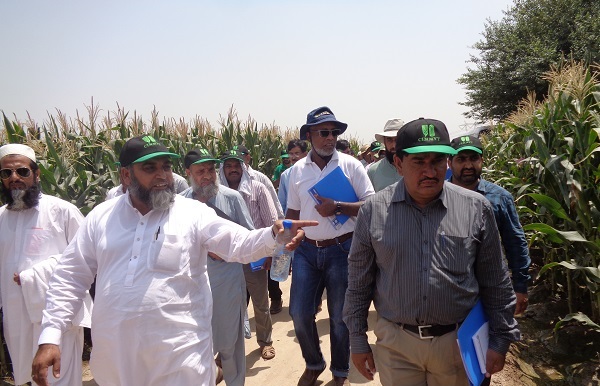ISLAMABAD (CIMMYT) – A recently held traveling seminar brought together private and public seed partners in Pakistan to enhance maize production and productivity in order to meet current demand and plan for future needs.
The seminar, hosted by the International Maize and Wheat Improvement Center (CIMMYT) in collaboration with Pakistan Agricultural Research Council (PARC), facilitated discussion around the demand for maize in Pakistan, which has experienced rapid growth in the last thirty years largely due to its demand for feed and food as a result of rapid population growth.
Pakistan is one of the top producers of maize in South Asia and it is the country’s third most important cereal, with production increasing 75 percent since 1990 due to the expansion of hybrid maize varieties in the spring season. However, the lack of a strong national seed system has caused the country to import 85 percent of its maize for roughly $50 million annually, making the retail price of seed very expensive for farmers.
Since 2013, CIMMYT’s Agricultural Innovation Program (AIP) has built public-private partnerships to catalyze equitable growth in agricultural production, productivity and value in Pakistan. AIP encourages leaders in the local private sector through product allocation and capacity building to produce quality maize seeds and enhance Pakistan’s seed sector.
During the traveling seminar – which was held for seven days in two phases – participants evaluated the performance of different CIMMYT maize products at the project’s partner research center, located in the Punjab province which is the hub of Pakistan’s yellow maize production and the major source of poultry feed, a robust industry growing 8-10 percent annually.
Participants also visited Khyber Pakhtun Khwa province where white maize is the dominant dietary staple. During the visit stakeholders were able to be better understand the dynamics of major maize producing areas and future production trends, various crop management technologies, adoption and utilization patterns, production constraints and dissemination of maize-based technologies.
Concluding the seminar, Yusuf Zafar, Chairman of the Pakistan Research Council commended CIMMYT for creating multi-stakeholder collaborations and actions towards increasing the production and productivity of maize in Pakistan. He pressed the private sector to take the lead in the production and dissemination of the new maize products shared under the AIP program.
CIMMYT’s Country Representative Muhammad Imtiaz, also called upon the private sector to continue to strive to meet the project’s goals of a self-sufficient maize seed sector after the project ends early next year.

 Capacity development
Capacity development 
